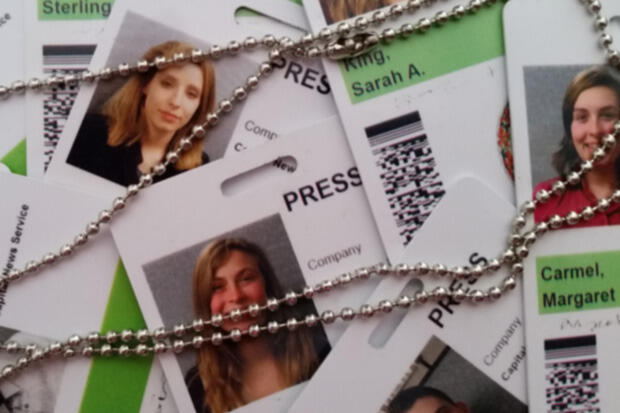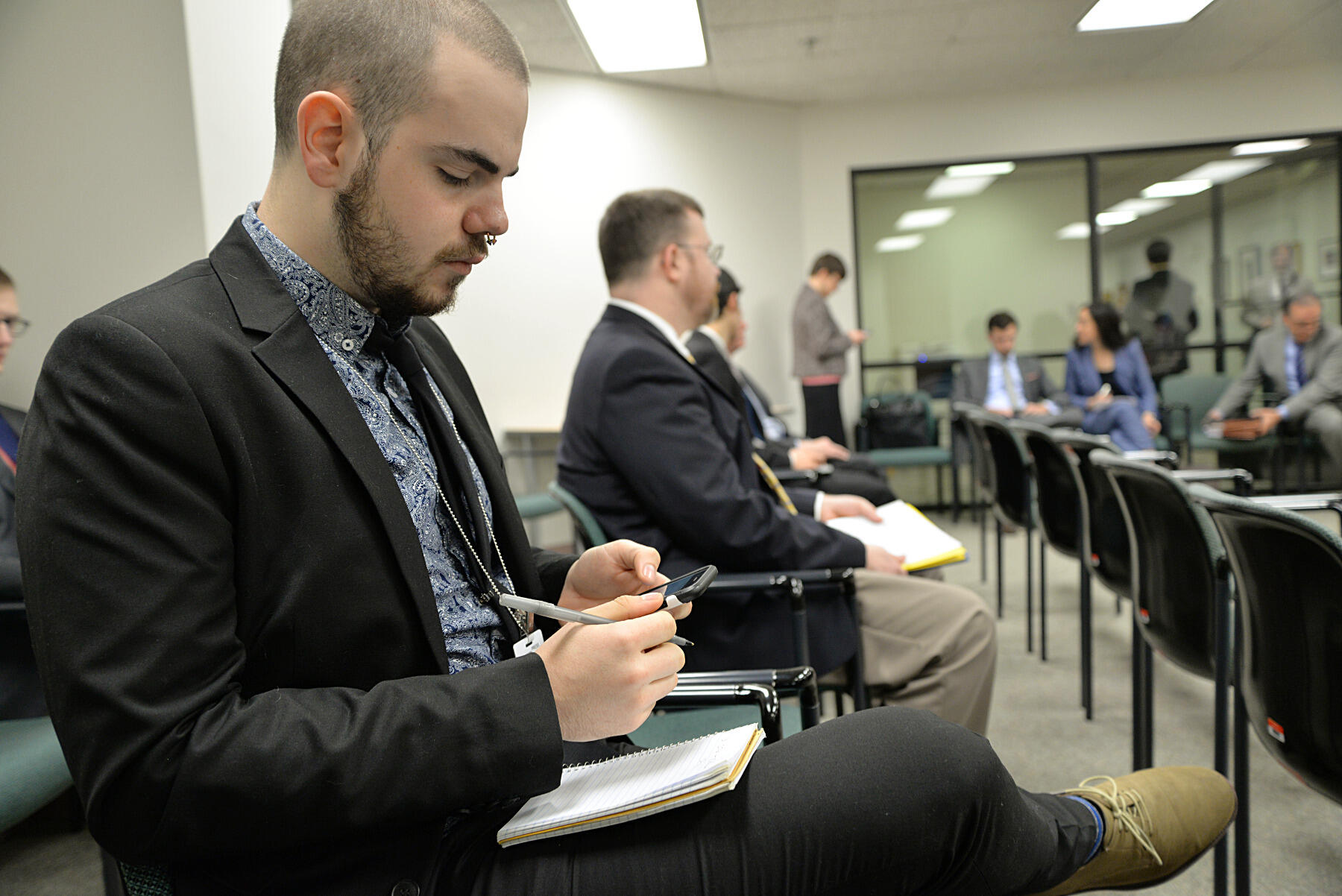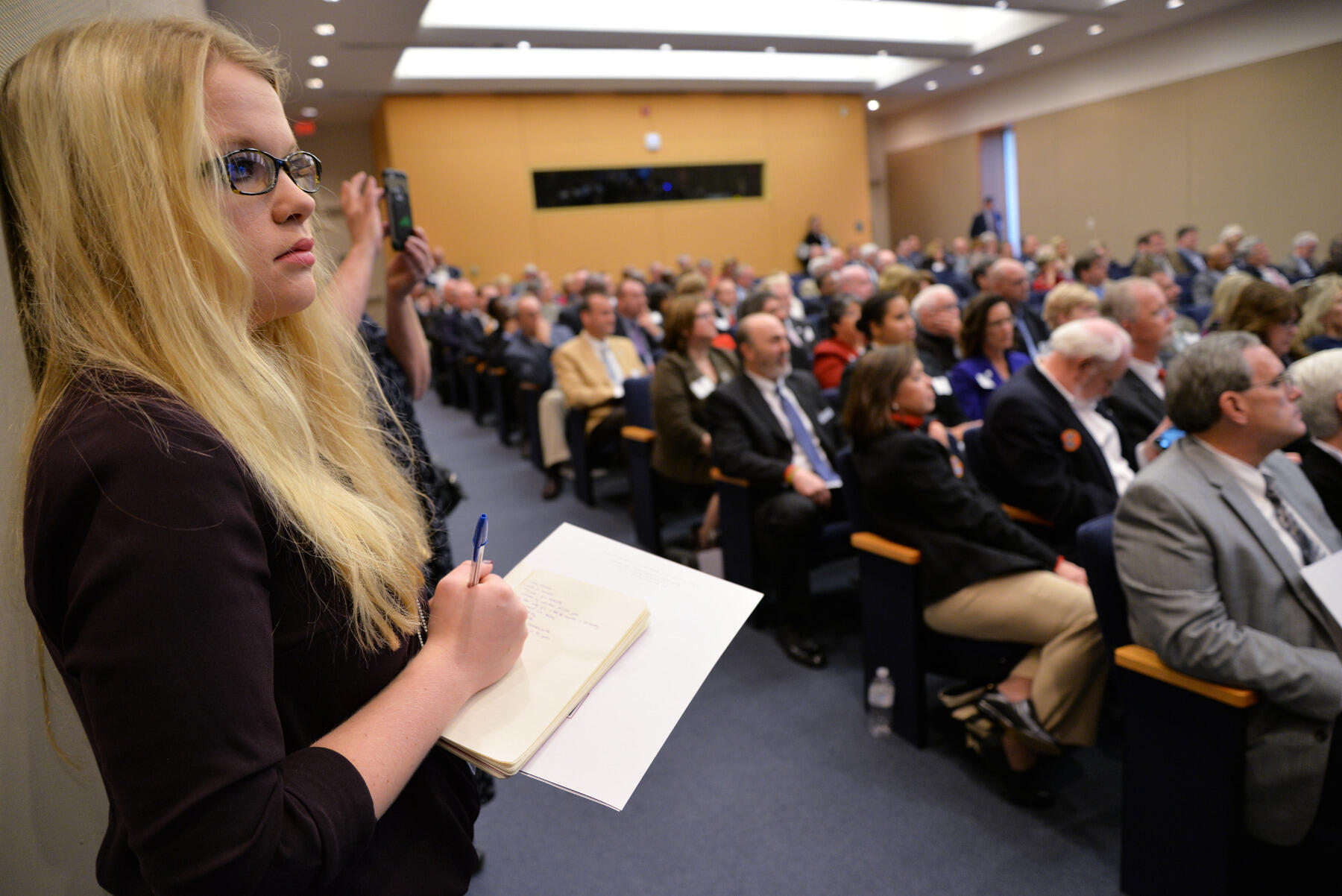
Feb. 6, 2017
Making headlines: VCU journalism students are covering the General Assembly for 90 news outlets and feeding stories to the Associated Press
Share this story
On a recent morning at the General Assembly, a Virginia Senate subcommittee considered legislation backed by the oil and gas industry that would keep chemical recipes used in fracking confidential as trade secrets. Among the lobbyists, activists and others observing the debate, Virginia Commonwealth University senior journalism major Tyler Hammel was listening carefully and taking notes.
Hammel, who was covering the meeting as part of the Capital News Service program of VCU’s Richard T. Robertson School of Media and Culture, quickly filed a news article about the meeting, “Panel amends and OKs bills on hiding fracking chemicals,” which was published by the The Daily Progress in Charlottesville and RVA Hub in Richmond.
“Covering the General Assembly is pretty hectic but rewarding,” Hammel said. “It’s almost like triage in a way because there’s no way you can possibly cover everything, so you have to make decisions about what is most important to you and what you think will get the most attention.”

Photo by Brian McNeill, University Public Affairs
Launched in 1994, VCU’s Capital News Service, a three-credit course at the Robertson School in the College of Humanities and Sciences, sends VCU journalism students to cover the General Assembly and other political and government news in Richmond for newspapers, TV stations, news sites and other media outlets across Virginia.
Today, Capital News Service provides coverage to roughly 90 news outlets throughout the state.
Media outlets that don’t have the resources to send a reporter to Richmond on a daily basis receive coverage of Virginia state government news. For students, they get the opportunity to cover major news stories coming out of the legislature, while gaining real-world work experience and clips that can help them land a job in journalism after graduation.
“The goal of the program is two-fold: To provide citizens of Virginia with the information they need to make good decisions about who to vote for and how their state government is operating. And then, of course, the secondary goal is to help student journalists get a toehold in the profession and develop a portfolio,” said Jeff South, director of the Capital News Service and associate professor of journalism in the Robertson School.
Feeding articles to the Associated Press
This semester, for the first time, select stories written by students in the Capital News Service are being distributed by the Associated Press, resulting in their work getting published in major national media outlets, including The Washington Post.
Steve McMillan, Mid-Atlantic news editor for the AP, said the wire service is excited to be working with VCU’s Capital News Service this year, following a similar arrangement that launched in the fall between the AP and the University of Maryland’s Capital News Service.
It never hurts to have more journalists, including journalists-in-training, at the statehouse gathering news.
“So far, the students are doing an excellent job of identifying stories at the legislature and producing them on a fairly tight deadline so we can get them on the AP wire here in Virginia for use by our newspaper and broadcast members,” McMillan said.
“One of the aims of the partnership is to give the CNS stories broader distribution and distribution to larger news outlets than those stories have right now,” he added. “But from our standpoint as a wire service it benefits us by providing additional news content to our members. It never hurts to have more journalists, including journalists-in-training, at the statehouse gathering news, especially in this time of smaller news staffs industrywide.”
A few stories by Capital News Service students that have gone out on the AP wire have reached a national audience.
On Jan. 27, for example, VCU junior print/online journalism major Megan Schiffres’ coverage of legislation targeting the opioid crisis ran in The Washington Post, The Charlotte Observer, The Chicago Tribune, the San Antonio Express-News, The News Tribune (Tacoma, Washington), the Huron Daily Tribune (Michigan), a news website in Georgia, Federal News Radio, CBS 6 in Richmond and elsewhere.
“This was my second article to get picked up by the AP and Washington Post,” she said. “I was thrilled it got so much coverage, especially because the opioid crisis in Virginia is a serious issue deserving of public attention.”
Hammel, meanwhile, saw his coverage of legislation seeking to end the photo ID requirement for voting get published in The Washington Post on Jan. 17. His work has also been picked up by The Free Lance-Star in Fredericksburg, InsideNoVa.com, 8 News and NBC12 in Richmond, the Culpeper Times and many other news outlets.
“It’s pretty cool,” he said. “I’m not getting paid for anything I write, so it’s really great to [have it be published] as far out as I can.”
Hammel had previously covered the General Assembly from time to time while interning with GayRVA and RVAMag. This semester, he’s visiting the legislature two to four times a week.
“A lot of people don’t understand how the General Assembly really works,” he said. “It’s weird. I know that’s not a great way to describe it, but a lot goes on pretty fast. It’s hard to cover it all, and it’s all pretty important. So CNS is a cool opportunity to cover and talk about something that I’m interested in, while also getting class credit for it.
“There was a bill that was proposed that would have repealed the requirement to have a photo ID to vote, [but] it got struck down,” he added. “I’ve also covered a couple LGBT workplace protection bills, which also got struck down. And I covered Del. Bob Marshall’s bill that would have prevented transgender people from using the bathroom of their choosing.”
Jesse Adcock, a junior journalism major and Honors College member, said covering the General Assembly for the Capital News Service is “a lot like swimming in the ocean.”
“Professor South is a great mentor and kind of points which way to swim,” he said. “Other than some basic requirements for the number of pieces and multimedia, he doesn’t require we swim in a particular direction or any farther or harder than we ourselves want to. I feel he works very hard to make sure that we have all the tools we need to work as hard as we want to. It’s a very individual thing and I like to do things on my own so I think I’m getting along splendid.”
Adcock added that he is grateful to have the opportunity the Capital News Service is providing.
“Kids are getting published in The Washington Post left, right and center,” he said. “What other program does that? Gives us students such opportunity? [Jeff South] is great, the class is great, I’m having a great time, great, great time.”
Jessica Nolte, a senior interdisciplinary studies major, has also seen her work get picked up extensively. She covered a Virginia rally at the Women’s March on Washington, which ran on InsideNoVa.com, with a number of her photos. Her coverage of Gov. Terry McAuliffe’s speech on the economy to the Virginia Municipal League was published by 8 News.
“It’s been really exciting to interact with client news sources, and see my work shared on different news platforms and social media,” Nolte said. “The experience has been valuable so far because it has such a realistic approach beyond the classroom. There are quick deadlines and I’m learning how to write much faster than I’m [used] to.”

Photo by Brian McNeill, University Public Affairs
Real deadlines, real news outlets, real stories
Over the past 23 years, nearly 350 VCU students have taken part in the Capital News Service, many of whom have gone on to work in journalism.
Ryan Murphy, a reporter who recently joined The Virginian-Pilot after three-and-a-half years at the Daily Press in Newport News, is among the Capital News Service alumni. Last April, the Virginia Press Association named him the state’s Outstanding Young Journalist of the Year.
“Capital News Service was definitely one of the best classes in the journalism program. Other classes encouraged you to get out and do some reporting. CNS forced you. You didn’t have a week or two to turn something around. You were working on real deadlines for real newspapers reporting on real stories,” Murphy said. “The experience very quickly showed me what being a reporter means on a day-to-day basis. You aren’t just sitting around talking about what it would be like to cover the General Assembly — you just start covering it, shoulder to shoulder with veteran professionals and elected officials.”
Another Capital News Service alumnus, Craig Carper, is news director of WCVE Richmond Public Radio.
“Participating in the Capital News Service was a great boot camp for what it’s like to be a working journalist,” Carper said. “Things move fast at the General Assembly, so it’s a great place for students to learn how to turn around stories on a tight deadline and really fine tune their writing skills in the real world.”
“Now in the workplace I’m continuing to benefit from CNS,” Carper said. “With more boots on the ground, they’re turning around more daily copy on the business at the state capitol than most news operations in the state. CNS provides these stories to media partners at no cost. It’s been very helpful to all of our newscasters to read CNS material on air. The Capital News Service is a wonderful partnership that benefits everyone involved.”
Editors at media organizations that publish Capital News Service stories say the students’ stories help fill an important need for coverage of the General Assembly and legislation that impacts their readers.
“We appreciate Capital News Service because it gives us an extra level of coverage and tips during the General Assembly session,” said David Fritz, executive editor of the The News Leader (Staunton). “Being paired with a student journalist lets us quickly inquire about issues we care about but are out of position to report on.”
The experience of not just covering the General Assembly, but also working directly with media professionals provides VCU students with invaluable networking opportunities, South said.
“The students are talking to these editors regularly,” he said. “Frequently they field calls from the editors, who might ask them to do a specific story. I try to get them to develop a relationship.”
Many of the current students say they are hoping to find careers in journalism or related communications fields.
“I want to pursue something in communication and writing or editing,” Nolte said. “CNS is exposing me to a new option in journalism that I’ve never experienced before. I think it’s also been really helpful in giving me a closer look at what being a working journalist might entail.”
Subscribe for free to the VCU News email newsletter at http://newsletter.news.vcu.edu/ and receive a selection of stories, videos, photos, news clips and event listings in your inbox every Monday and Thursday.
Subscribe to VCU News
Subscribe to VCU News at newsletter.vcu.edu and receive a selection of stories, videos, photos, news clips and event listings in your inbox.













